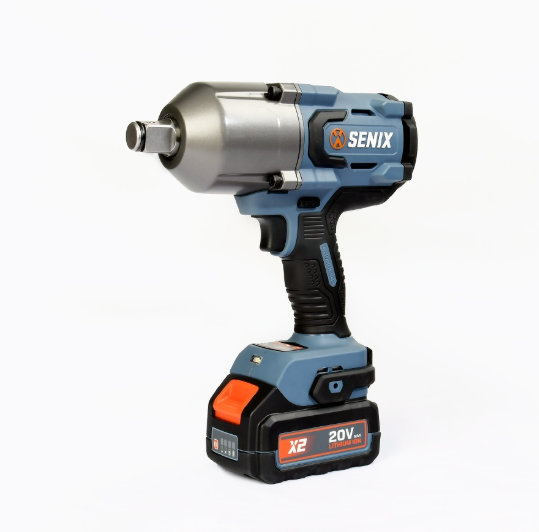What Size Impact Wrench Do I Need for Lug Nuts?
Choosing the right size impact wrench for lug nuts is crucial for ensuring that you can safely and effectively tighten or loosen them without damaging the wheel or lug nut. The power of an impact wrench is measured in torque, usually expressed in foot-pounds (ft-lbs) or Newton-meters (Nm). The right size impact wrench for lug nuts depends on several factors, including the type of vehicle, the size of the lug nuts, and whether you're using it for professional or personal use. Here’s a detailed guide to help you select the right impact wrench size for lug nuts.
1. Understanding Torque Requirements for Lug Nuts
The torque required to tighten lug nuts varies depending on the vehicle, the size of the lug nut, and the manufacturer's specifications. Most passenger vehicles require around 80-120 ft-lbs of torque for standard lug nuts, while larger vehicles such as trucks and SUVs may require higher torque, typically between 100-150 ft-lbs. Heavy-duty vehicles and commercial trucks often require torque values above 200 ft-lbs.
- **Passenger Vehicles**: 80-120 ft-lbs of torque is typically sufficient for most car lug nuts.
- **SUVs and Light Trucks**: 100-150 ft-lbs of torque may be necessary for larger vehicles.
**Heavy-Duty Trucks**: These may require 200+ ft-lbs, depending on the size and type of lug nuts.
20V Brushless 9.5mm Impact Wrench
2. Choosing the Right Impact Wrench Size
When selecting an impact wrench, you want to match the torque rating of the tool to the torque requirements of your lug nuts. Most impact wrenches come in 1/4-inch, 3/8-inch, 1/2-inch, and 3/4-inch drive sizes, with the drive size affecting the tool’s torque capacity and size of the lug nut socket.
- **1/4-Inch Drive Impact Wrench**: These are typically lightweight and compact tools suited for smaller fasteners. However, they generally do not provide enough torque for lug nuts, so they’re not recommended for automotive use.
- **3/8-Inch Drive Impact Wrench**: These are suitable for light automotive work, including smaller lug nuts or low-torque applications. However, they may not be powerful enough for larger lug nuts on heavy-duty trucks or SUVs.
- **1/2-Inch Drive Impact Wrench**: This is the most common and versatile size for car owners and professional mechanics alike. A 1/2-inch impact wrench typically provides between 200-500 ft-lbs of torque, which is enough for most passenger vehicles, SUVs, and light trucks.
**3/4-Inch Drive Impact Wrench**: These are designed for heavy-duty applications and are suitable for larger vehicles, including commercial trucks, vans, and vehicles with larger, high-torque lug nuts. A 3/4-inch impact wrench can provide torque of up to 1,000 ft-lbs or more, making it suitable for heavy-duty use.
Shop heavy duty fastening power tools.
3. Electric vs. Pneumatic Impact Wrenches
Impact wrenches are available in both electric and pneumatic (air-powered) versions. While both types are capable of delivering high levels of torque, there are some differences to consider:
- **Electric Impact Wrenches**: These are battery-powered or corded, making them portable and easy to use without a compressor. They’re ideal for home users and smaller shops. Electric impact wrenches typically offer torque levels in the 150-700 ft-lbs range, depending on the model. SENIX 20V High Torque Impact Wrench reaches 2000N.m Max. power.
**Pneumatic Impact Wrenches**: These require an air compressor to operate and are generally preferred by professionals for their higher torque capabilities and durability. Pneumatic impact wrenches can offer torque from 300 to over 1,000 ft-lbs, making them suitable for a wider range of applications, from passenger cars to heavy-duty trucks.
20V Brushless 19mm Impact Wrench
4. Torque Range and Power Source
The torque rating of an impact wrench is the most important factor when choosing the right tool for lug nuts. Here’s what to consider:
- **For Passenger Cars**: A 1/2-inch drive impact wrench with a torque range of 200-500 ft-lbs is usually sufficient for most passenger car lug nuts.
- **For SUVs and Light Trucks**: A 1/2-inch or 3/4-inch drive impact wrench with a torque range of 300-600 ft-lbs will be more effective for SUVs and light trucks.
**For Heavy-Duty Trucks**: For larger trucks and commercial vehicles, a 3/4-inch drive impact wrench with 600-1,000+ ft-lbs of torque is recommended to handle the increased load and larger lug nuts.
5. Choosing Between Corded, Cordless, and Air-Powered Models
When selecting the right impact wrench, it's also important to consider the power source, as this can impact the convenience and performance of the tool:
- **Corded Electric Impact Wrenches**: These provide constant power without worrying about battery life. They are ideal for stationary or garage work, where access to a power outlet is not an issue.
- **Cordless Electric Impact Wrenches**: Cordless models offer portability and flexibility, perfect for mobile mechanics or for use in tight spaces. Battery-powered wrenches generally have less torque than corded models but are sufficient for most car and light truck applications.
**Pneumatic Impact Wrenches**: These tools require a compressor and offer high torque, making them ideal for professional use in workshops or automotive shops. However, they are not as portable as cordless models and require a constant supply of compressed air.
6. Consider the Weight and Comfort
Since you’ll be using your impact wrench for an extended period, it’s essential to consider the weight and ergonomics of the tool. A heavier impact wrench may provide more torque but can be more difficult to handle, especially for users who need to work for prolonged periods.
- **Lightweight Models**: These are ideal for those who need portability and ease of use. However, lightweight models may sacrifice some torque output.
**Heavy-Duty Models**: For professional use, heavier models may offer higher torque, but they can cause fatigue during prolonged use.
7. Frequently Asked Questions (FAQs)
The most common impact wrench size for lug nuts is a 1/2-inch drive impact wrench, which is suitable for most passenger vehicles and light trucks. It typically offers torque levels between 200-500 ft-lbs.
A smaller impact wrench, such as a 3/8-inch drive model, may struggle to provide enough torque for larger vehicles or heavy-duty lug nuts. For SUVs, trucks, and heavy-duty vehicles, a 1/2-inch or 3/4-inch drive impact wrench is recommended for sufficient power.
Not necessarily. If you choose an electric impact wrench, you won’t need an air compressor. However, pneumatic impact wrenches require compressed air to operate, making them ideal for professional or high-torque applications but less portable.
To avoid over-tightening lug nuts, it’s important to use a torque wrench or an impact wrench with a torque setting feature that limits how much force is applied. Follow the manufacturer’s recommended torque specifications for your vehicle.
Conclusion
Choosing the right size impact wrench for lug nuts depends on the size and type of vehicle, as well as the specific torque requirements. A 1/2-inch drive impact wrench is typically sufficient for most passenger vehicles, while larger vehicles may require more powerful models like 3/4-inch drive impact wrenches. Make sure to factor in power source, comfort, and durability when making your decision. With the right impact wrench, you’ll be able to quickly and safely tighten or loosen lug nuts with ease.


 (5.0)
(5.0)



